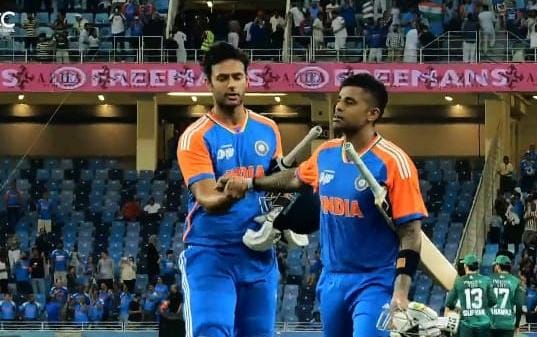India outclassed Pakistan in the Asia Cup 2025 clash on Sunday, and no—the teams did not shake hands at the end.; While AIMIM and Shiv Sena (UBT) denounced the match as an insult to martyrs and officials defending their stance to play, India silenced Pakistan on the field with a commanding seven-wicket victory
 Photo courtesy social media
Photo courtesy social media
India outclassed Pakistan in the Asia Cup 2025 clash on Sunday, and no—the teams did not shake hands at the end. India cruised to victory by seven wickets, chasing down 128 with ease after Pakistan managed only 127 for nine. Suryakumar Yadav anchored the chase with an unbeaten 47, sealing the win in just 15.5 overs.
But more than the result, attention was drawn to the behaviour and attitude of the Indian side. Captain Suryakumar Yadav and his team skipped the customary handshake with Pakistan—both before the match at the toss and after the game. While Pakistan’s players were seen waiting, the Indians had already started walking off. Reports suggest the move was directed by the BCCI and aligned with the Indian government’s stance. Yadav later confirmed that it was a team call, taken in line with the BCCI and government directives. “Some things in life are bigger than sportsmanship,” he said, dedicating the victory to the armed forces and expressing solidarity with the victims of the Pahalgam terror attack.
Pakistan’s coach, Mike Hesson, voiced disappointment, saying the players “went over but found the doors closed.” Captain Salman Ali Agha skipped the post-match presentation in protest, while the team management lodged a formal complaint, calling the snub a breach of sportsmanship.
On social media, many hailed the move by the Indian team, seeing it as a symbolic response to the Pahalgam terror attack and India’s subsequent ‘Operation Sindoor’. Analysts noted that in such moments, politics and national sentiment often override traditional norms of sportsmanship, sparking a debate: should sport remain separate from politics, or do such gestures carry deeper meaning?
The refusal to shake hands carried strong political weight in India. With backing from the BCCI and government, the Indian team signaled that cricket cannot be “business as usual” with Pakistan after terror incidents—a message that resonates with a large section of voters who expect a firm stance. It also helps the ruling BJP maintain control over the nationalist narrative.
“Symbolic acts like this tend to play strongly in Indian politics,” analysts observed. “Voters who lean towards nationalist sentiment may see it as India showing strength, pride, and solidarity with soldiers. Anyone who objects risks appearing ‘soft,’ even if purists argue it goes against the spirit of cricket.”
AIMIM and Shiv Sena (UBT) had opposed the match even before it was played, calling it an insult to the Pahalgam martyrs. Asaduddin Owaisi questioned whether crores earned from TV rights were valued more than the lives lost, with AIMIM leaders threatening to disrupt public screenings. Shiv Sena (UBT) staged protests in Mumbai, burning effigies, smashing televisions, and launching a “Sindoor Raksha” campaign to symbolically convey women’s anguish to the Prime Minister. Both parties accused the BJP of putting money above national sentiment, insisting no cricket should be played with Pakistan while blood is being shed.
Officials, however, pointed out that India’s participation in multilateral tournaments is mandatory. Withdrawing could jeopardize future hosting rights, they argued. While bilateral series with Pakistan remain off the table, multi-team events follow different rules. To manage public sentiment, the BCCI has quietly adopted what some call an “invisible boycott”: no senior office-bearers attended the match in Dubai, and players were instructed to follow official directives while keeping their focus on cricket.